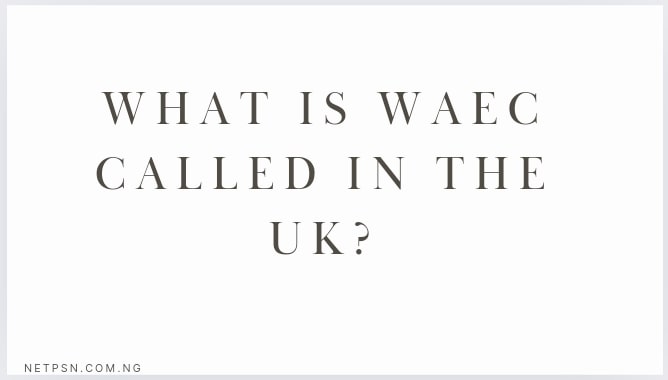The West African Examinations Council (WAEC) is a prominent examination board responsible for conducting examinations across English-speaking West African countries. These exams are comparable to What is WAEC called in the UK as GCSEs and A-Levels, which are conducted by examination boards such as AQA, OCR, Edexcel, and CIE. Both WAEC and UK examination systems are recognized for their rigor and are widely accepted by educational and professional institutions internationally.

Key Aspects of WAEC and UK Examination Systems
Comparative Analysis of Curriculum and Standards
Both WAEC and UK boards aim to assess the educational attainment of students in a wide range of subjects. However, the specific curricula and assessment standards differ, reflecting regional educational priorities and methodologies. WAEC examinations typically cover school subjects for West African countries and include distinctive regional content, whereas UK qualifications like GCSEs and A-Levels offer a broader international curriculum that is often regarded as more versatile for global academic and career pursuits.
Recognition and Equivalence
For students moving from West Africa to the UK, understanding the equivalence of WAEC qualifications is crucial. UK NARIC (National Recognition Information Centre) provides guidance on comparing international qualifications, stating that WAEC’s Senior School Certificate Examination (SSCE) is considered comparable to the GCSE, which students typically sit at the age of 16. This recognition facilitates educational and professional opportunities for WAEC holders in the UK.

Bridging the Gap: How WAEC Holders Can Transition to the UK Education System
Further Education and Career Opportunities
Students with Waec qualifications looking to further their education in the UK may need to meet additional requirements, depending on the institution and course. For higher education, especially in competitive fields or prestigious universities, additional A-Level qualifications or a foundation year might be necessary.
Practical Steps for Equivalence on WAEC called in the UK
- Verification of Certificates: WAEC certificate holders should verify their certificates through the WAEC online system to prove authenticity.
- Assessment by UK NARIC: For a detailed equivalence statement, individuals can apply to UK NARIC, which will provide a document stating how their qualifications compare to UK standards.
- Foundation Courses: Enrolling in a foundation course can bridge the gap between different educational systems, preparing students for success in further academic pursuits in the UK.
Leveraging WAEC Qualifications in the UK
Advantages in the Competitive Job Market
Possessing WAEC qualifications, along with an understanding of their UK equivalence, can provide a competitive edge in job applications, especially in fields where specific knowledge of African markets and communities might be beneficial. Employers value the diverse perspectives and backgrounds that international qualifications bring.
Continuous Professional Development
For those looking to advance their careers in the UK, continuing professional development (CPD) courses and certifications can complement their WAEC qualifications, enhancing their skills and meeting local professional standards. Explore further to expand your understanding on UK Universities
Conclusion on What is WAEC called in the UK
Understanding the equivalence of What is WAEC called in the UK is essential for students and professionals aiming to transition smoothly between these educational systems. By recognizing the value of WAEC certificates and effectively mapping them to UK standards, individuals can unlock numerous educational and professional opportunities.
FAQ on “What is WAEC called in the UK?”
1. What is the equivalent of WAEC in the UK?
The West African Examinations Council (WAEC) does not have a direct equivalent in the United Kingdom. In the UK, the closest equivalents to WAEC are the General Certificate of Secondary Education (GCSE) and the A-Levels. These qualifications are typically taken by students at the end of their compulsory education and further education phases, respectively.
2. How do WAEC qualifications compare to UK qualifications?
WAEC qualifications, particularly the West African Senior School Certificate Examination (WASSCE), are recognized internationally and can be compared to the GCSEs in the UK. Both qualifications serve as a prerequisite for further education or entry into professional fields. Universities and employers in the UK generally accept WAEC qualifications, provided they meet specific grade requirements.
3. Can WAEC certificates be used for admission into UK universities?
Yes, WAEC certificates are widely accepted by UK universities for admission into undergraduate programs. Applicants must typically have high grades in relevant subjects. However, some competitive courses might require additional qualifications, such as A-Levels or an International Baccalaureate (IB), for admission.
4. Are there any UK exams available for students in West African countries?
Yes, students in West African countries can also sit for international qualifications that are recognized in the UK, such as the International General Certificate of Secondary Education (IGCSE) offered by Cambridge Assessment International Education and the IB. These qualifications are considered on par with the GCSE and A-Levels.
5. What steps should a student take to transition from WAEC to UK educational system?
Students planning to transition from the WAEC system to the UK educational system should:
- Ensure their WAEC grades meet the entry requirements of the UK institution they wish to attend.
- Consider taking additional qualifications such as A-Levels or foundation courses if aiming for highly competitive courses.
- Obtain a statement of comparability from UK NARIC if there’s any uncertainty about how their qualifications are recognized.
- Prepare for potential language proficiency tests like IELTS, as required by most UK universities for non-native English speakers.



















+ There are no comments
Add yours